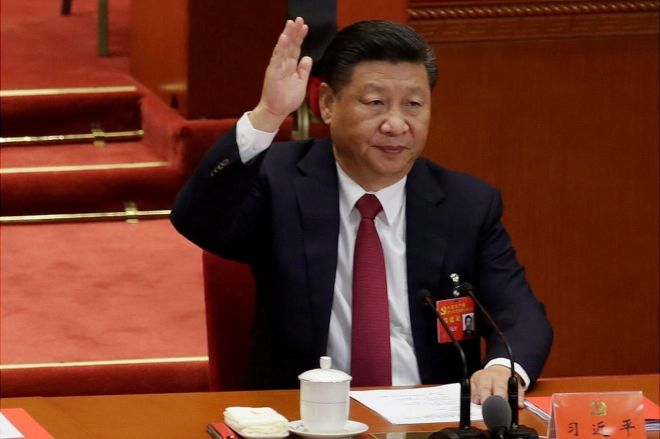 |
| Mr Xi took part in the vote on Tuesday |
The unanimous vote to write in "Xi Jinping Thought" happened at the end of the Communist Party congress, China's most important political meeting.
Mr Xi has steadily increased his grip on power since becoming leader in 2012.
This move means that any challenge to Mr Xi will now be seen as a threat to Communist Party rule.
The congress began last week with a three-hour speech by Mr Xi where he first introduced his philosophy called "socialism with Chinese characteristics in a new era".
Top officials and state media then began repeatedly mentioning this ideology, calling it "Xi Jinping Thought", in a sign that Mr Xi had cemented his influence over the Party.
Previous Chinese Communist Party leaders have had their ideologies incorporated into the party's constitution or thinking, but none, besides founder Mao Zedong, have had their philosophy described as "thought", which is at the top of the ideological hierarchy.
Only Mao and Deng Xiaoping have had their names attached to their ideologies.

New chapter of modern China
Carrie Gracie, BBC China Editor, Beijing
 |
| The change to the constitution puts Xi Jinping (left) on par with party founder Mao Zedong (right) |
China's new slogan hardly trips off the tongue.
But school children, college students and staff at state factories will now have to join 90 million Communist Party members in studying "Xi Jinping Thought" on the new era of socialism with Chinese characteristics.
The expression "new era" is the party's way of saying this is the third chapter of modern China.
If the first was Chairman Mao uniting a country devastated by civil war, and the second was getting rich under Deng Xiaoping, this new era is about even more unity and wealth at the same time as making China disciplined at home and strong abroad.
Enshrining all of this under Xi Jinping's name in the party constitution means rivals cannot now challenge China's strongman without threatening Communist Party rule.

More than 2,000 delegates have spent the week-long congress picking provincial party chiefs, governors and heads of some state-owned enterprises.
On Tuesday, they finalised the make-up of top bodies such as the Central Committee and the Central Commission for Discipline Inspection.
On Wednesday, the new Central Committee will decide who gets to be in the higher-level Politburo.
Though delegates get some say, in reality the elections are guided by the Party's top leadership where at each stage voters pick from pre-selected candidates.
Also on Wednesday, the Party will reveal the new members of its pinnacle body, the Politburo Standing Committee. Mr Xi is widely expected to remain as party leader.
Those in the Standing Committee will be especially scrutinised. The BBC's Robin Brant in Beijing says its make-up may give signs about who Mr Xi has in mind to succeed him.
Mr Xi's term ruling China has been marked by significant development, a push for modernisation and increasing assertiveness on the world stage.
However, it has also seen growing authoritarianism, censorship and a crackdown on human rights.
Source: BBCNews
